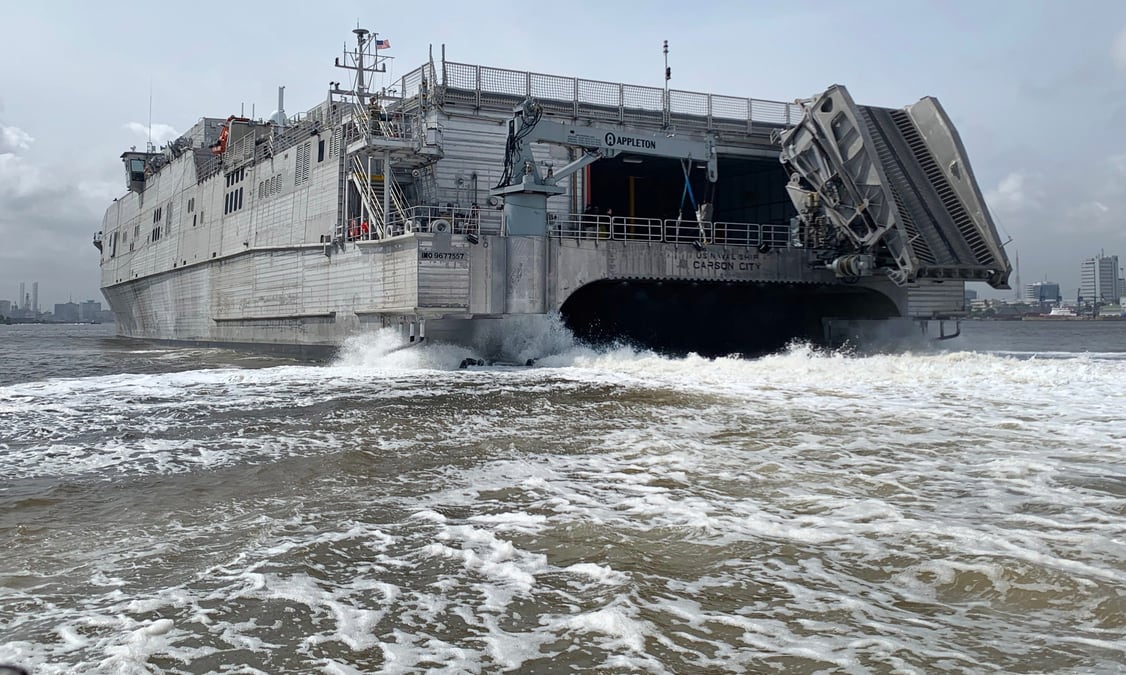Should the alleged rape of a civilian mariner in her cabin aboard a military sealift ship be covered by workers’ compensation claims?
That’s the argument being put forth by the U.S. government defense in an ongoing lawsuit filed by a woman mariner, Elsie Dominguez, who alleges she was raped in her bed aboard the expeditionary fast transport Carson City by its civilian captain in December 2021.
In a February filing in the U.S. District Court of the District of New Jersey, the government cited a decades-old court ruling to argue that worker’s comp claims were how cases like Dominguez’s have been handled in the past, and that the mariner’s case should be handled as such.
The government’s February motion to delay Dominguez’ case argues that the matter falls under the Department of Labor through the Federal Employees’ Compensation Act, or FECA. This motion follows a previous decision by the Navy, to whom Dominguez initially made an administrative claim last June.
The government’s argument is based on a 1952 legal decision in which the U.S. Supreme Court held that FECA, which provides monetary benefits for job-related injuries and illnesses, was the only “remedy” available to civilian mariners aboard government ships.
Attorneys for Dominguez, an assistant engineer who says she was sexually assaulted, call the suggestion “astonishing” and “offensive” in court filings.
RELATED

“It is inconceivable that the laws of the United States consider rape by a superior a natural, incidental, or anticipated risk of employment on a ship,” they wrote in a March 4 filing objecting to the government’s motion.
Dominguez and her attorneys told Military Times they believe the details of her allegations will prompt the court to reexamine a 72-year-old case law that, they say, should not apply to victims of sexual assault.
Dominguez alleges that her rapist, who is not named in the lawsuit and whose advances Dominguez said she had previously rejected, accessed her room with a Military Sealift Command-issued master code and began assaulting her while she lay unconscious.
According to her lawsuit, the trauma continued for more than a year, as the two mariners remained aboard the Carson City. Dominguez alleges she was told by an MSC civilian advocate that she could not make a restricted, or anonymous, sexual assault report, and that she would be immediately removed from her job if she made an unrestricted report.
Unable to obtain a deadbolt on her door for months as a work order remained unfilled, Dominguez began sleeping with a chair wedged against her door, the lawsuit states.
Dominguez made a formal rape report in June 2023 to the Navy’s Office of the Judge Advocate General, MSC’s Office of Counsel, Naval Criminal Investigative Service and the Coast Guard Criminal Investigative Service.
This triggered NCIS and CGIS investigations; the captain was placed on administrative leave and returned to the U.S. for questioning. Both he and Dominguez remain employees of MSC.
In a statement to Navy Times, NCIS spokesman Darwin Lam said the service “does not comment on, confirm details relating to, or confirm the existence of ongoing investigations that involve allegations of criminal sexual misconduct.”
In a memo filed March 4 objecting to the motion to stay, Dominguez’s attorneys argue that the alleged rape had nothing to do with the job, and that a platonic relationship between Dominguez and her boss predated their time on the ship by seven years.
The government responded in a March 11 memo, saying that while “being a victim of sexual assault is absolutely and unequivocally not ‘part of a mariner’s job duties aboard a U.S. Navy ship,’” similar cases, including those involving sexual assault, had been previously found to fall under worker’s comp.
In their filings, the government attorneys cited cases where worker’s comp was found to apply when a government employee was allegedly assaulted in her hotel room at a work conference and when a Customs and Border Patrol agent was tied to a chair with green U.S. customs tape and subjected to an assault involving “simulated sex.”
Dominguez’ lawyers contend that no case the government cites directly parallels Dominguez’s account, in which she claims she was raped off-duty, in her own quarters, by someone she’d known prior to her employment on the ship. In addition, they argue that rape should never fall into the category of workplace injury.
Christine Dunn, an attorney with Sanford Heisler Sharp representing Dominguez, told Military Times that the 1952 Supreme Court Case, Johanson vs. United States, was “bad law” that was ripe for reexamination.
“That’s a big part of why I do what I do is to help aid systemic change,” she said. “And I think that’s part of why Elsie is doing this: so that this won’t happen to other people.”
The court has yet to rule on the latest filings.
Hope Hodge Seck is an award-winning investigative and enterprise reporter covering the U.S. military and national defense. The former managing editor of Military.com, her work has also appeared in the Washington Post, Politico Magazine, USA Today and Popular Mechanics.





